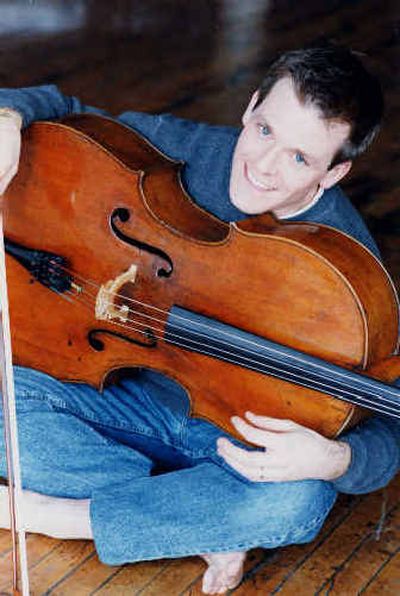Gerhardt settles in among great cellists

Alban Gerhardt began playing the violin when he was 4.
“It was an experiment of my father’s,” he says, “and it failed miserably.”
Gerhardt also studied the piano. “One day when I was 9,” he says, “my mother asked me if I would like to play another instrument. ‘How about the cello?’ she said.”
Now, at 37, Gerhardt is acknowledged as one of the world great cellists.
He will play Schumann’s Cello Concerto with the Spokane Symphony on Friday at the Opera House. The concert, conducted by the symphony’s music director, Eckart Preu, also will include Weber’s Overture to “Der Freischutz” and Brahms’ Symphony No. 1.
Gerhardt’s father was a violinist in the famed Berlin Philharmonic.
“Our home was filled with music when I was growing up,” he says. “There was my mother’s lovely singing and my father competing with his quartet rehearsals.”
Gerhardt began his studies in Berlin, then came to the United States to study at the Cincinnati Conservatory with Boris Pergamenschikov and members of the LaSalle and Tokyo Quartets.
He made his orchestral debut with the Berlin Philharmonic in 1991. His solo career was already well under way with competition victories that included the ARD Competition in Munich and the Leonard Rose Competition in New York.
“It was always my dream to become a member of my father’s orchestra,” Gerhardt recalls. “But when the opportunity came with the early retirement of the Philharmonic’s principal cellist, I didn’t take the audition, against the advice of my father and his colleagues.
“I knew at 23, I was too young to be ‘set up for life.’ I did not want my natural laziness to keep me from trying to reach my boundaries which, as I grow older, have moved further and further away.”
After living in New York for a while, Gerhardt now lives in Berlin with his wife, Katalina, and their 6-year-old son, Janos Antonio.
“Berlin is a huge city,” the cellist says, “but the center, where we live, is comparatively small. We are only a few minutes from the Philharmonic Hall and the Opera, and only seven minutes to the airport.”
More importantly, he says, “We are only two minutes walking from a playground with a lake.
“Right now my son studies the piano, but there is no fear that he will turn into a musician as well. He doesn’t make himself practice, and when I am not practicing myself, I just want to do fun things with him rather than making him practice.”
Gerhardt’s repertoire covers the range of cello literature from the baroque to the avant-garde modern, including the standard concertos by Dvorak and Tchaikovsky alongside new ones by Stephen Albert and Henri Dutilleux.
Two of his recordings have won ECHO prizes, Germany’s equivalent of the Grammys: Brahms’ Sonatas and Anton Rubinstein’s Cello Concerto No. 1.
“But the Schumann Concerto encompasses for me more of the human psyche than any of the other romantic concertos,” Gerhardt says of the piece he’ll perform Friday.
“It is more complex; as music it has that ‘all-or-nothing’ attitude we know from Goethe’s Werther,” he says. “But at the same time it in more songlike than the others; it shows just what a fantastic songwriter Schumann was.”
Preu will open the concert with the overture to Carl Maria von Weber’s opera “Der Freischutz” and will close with Johannes Brahms’ Symphony No. 1.
Many see Weber’s 1821 opera as marking the beginning of musical romanticism.
“The plot is so typical of the romantic,” Preu says, “with the central scene in the middle of a dark forest and the casting of magic bullets by an evil magician – so evil he doesn’t even sing, he speaks.”
Brahms’ First Symphony was produced only after the composer worked on it for nearly 15 years and discarded several early efforts. “I heard the steps of Beethoven behind me,” Brahms said at the time.
The 19th-century conductor Hans von Bulow, one of Brahms’ most ardent champions, called the composition “Beethoven’s Tenth.”
Gerhardt and Preu will join host Verne Windham for the symphony’s Classical Chats program today at 12:15 p.m. in the council chambers at City Hall. The 30-minute program will be televised on City Channel 5.
Preu will discuss the music on Friday’s program as part of the Gladys Brooks Pre-Concert Talks series in the Opera House auditorium at 7 p.m.